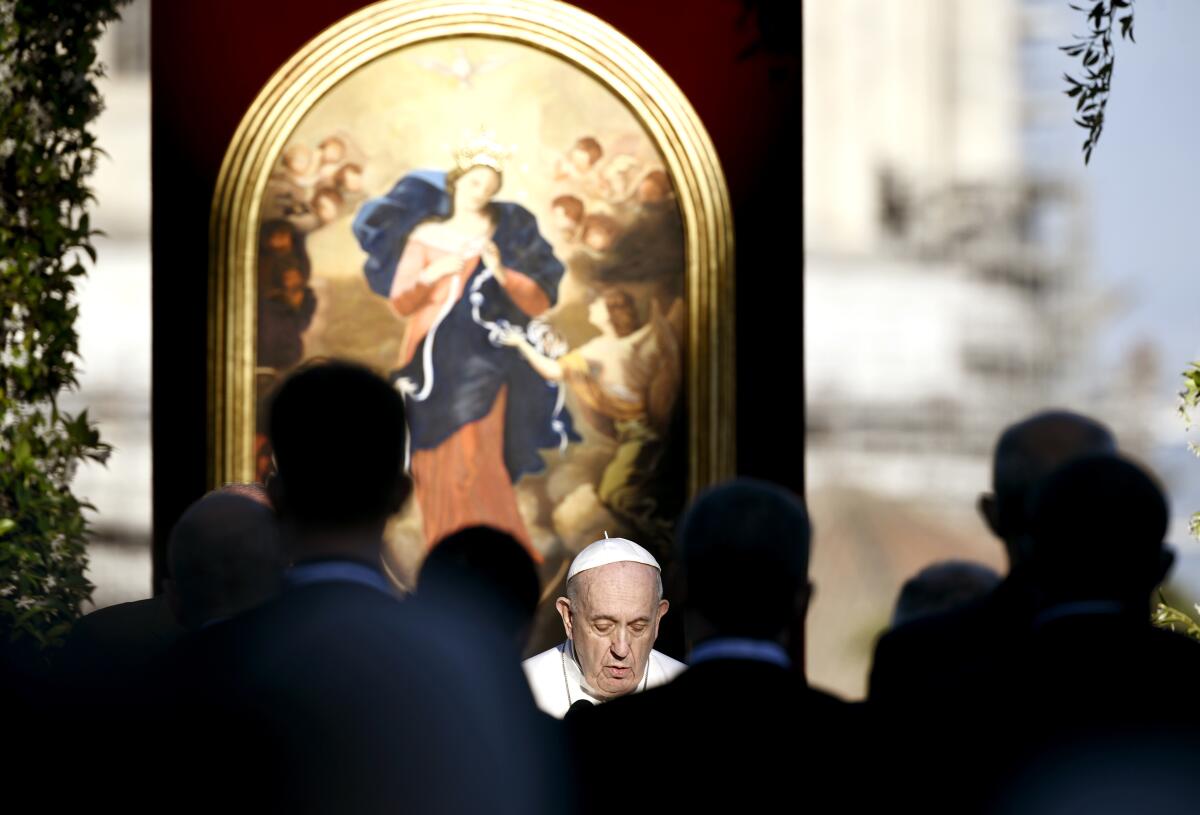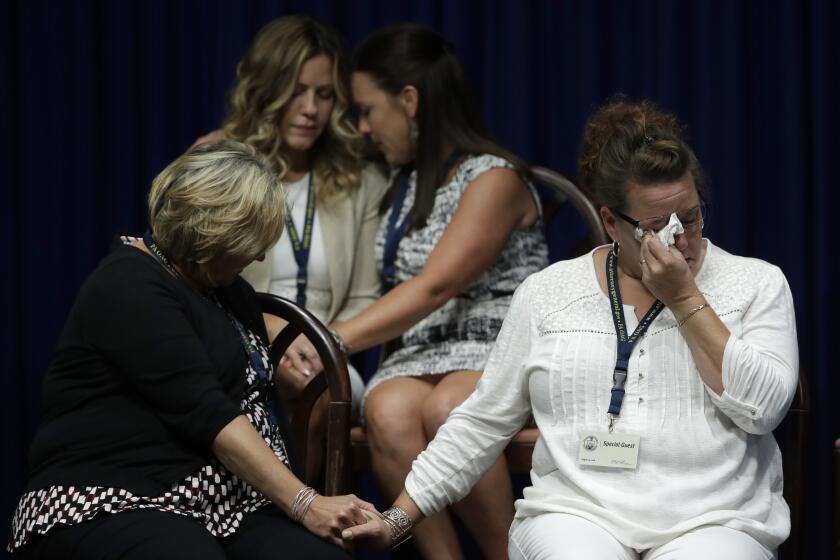Vatican issues new law criminalizing priestly abuse of adults, not just of minors

- Share via
VATICAN CITY — Pope Francis has changed Roman Catholic Church law to explicitly criminalize the sexual abuse of adults by priests and to say that laypeople who hold church office can also be sanctioned for similar sex crimes.
The new provisions, released Tuesday after 14 years of study, were contained in the revised criminal law section of the Vatican’s Code of Canon Law, the in-house legal system that covers the 1.3-billion-strong Catholic Church.
The most significant changes are contained in two articles, 1395 and 1398, which aim to address major shortcomings in the church’s handling of sexual abuse. The law recognizes that adults, too, can be victimized by priests who abuse their authority, and said that laypeople in church offices, such as school principals or parish economists, can be punished for abusing minors as well as adults.
The Vatican also criminalized the “grooming” of minors or vulnerable adults by priests compelling them to look at pornography. It’s the first time that church law has officially recognized as criminal the method used by many sexual predators to build relationships with their victims and then sexually exploit them.
The law also removes much of the discretion that had long allowed bishops and religious superiors to ignore or cover up abuse, making clear that they can be held responsible for failing to properly investigate and sanction errant priests. A bishop can be removed from office for “culpable negligence” or if he fails to report sex crimes to church authorities, though there is no punishment foreseen in the church law if he fails to report the crime to police, the law says.
Ever since the 1983 code was issued, lawyers and bishops have complained that it was completely inadequate to deal with the sexual abuse of minors, since it required time-consuming trials. Victims and their advocates, meanwhile, have argued that it left too much discretion in the hands of bishops who had an interest in covering up for the priests in their charge.
U.S. Roman Catholic bishops tallied 4,434 sex abuse allegations against clergy in 2018-19 — triple the number from the previous year.
The Vatican has issued piecemeal changes over the years to address the problems and loopholes, most significantly requiring all cases to be sent to the Holy See for review and allowing for a more streamlined administrative process to defrock a priest if the evidence against him is overwhelming.
More recently, Francis passed new laws to punish bishops and religious superiors who failed to protect their flocks.
The new criminal code incorporates those changes and goes beyond them, while also recognizing accused priests are presumed innocent until proven otherwise.
According to the new law, a priest who engages in sexual acts with anyone — not just a minor or someone who lacks the use of reason — can be defrocked if he uses “force, threats or abuse of his authority” to engage in sexual acts. Monsignor Juan Ignacio Arrieta, secretary of the Vatican’s legal office, said that could cover any rank-and-file member of the church who is sexually abused by a priest if it can be shown that the priest used force or abused his authority.
Even as it has pledged to go after predators provide support to those harmed by clergy, the Catholic Church has done little to identify and reach sexual abuse victims.
That provision is contained in a section detailing violations of the priest’s obligation to remain celibate. Another section of the law concerns priestly crimes against the dignity of others, including sexual abuse of minors and vulnerable adults.
The Vatican has long considered any sexual relations between a priest and an adult as sinful but consensual, believing that adults are able to offer or refuse consent purely because of their age. But amid the #MeToo movement and scandals of seminarians and nuns being sexually abused by their superiors, the Vatican has come to realize that adults can be victimized, too, if they are in a relationship with a power imbalance.
That dynamic was most clearly recognized in the scandal over ex-Cardinal Theodore McCarrick, the former archbishop of Washington. Even though the Vatican knew for years that he slept with his seminarians, McCarrick was put on trial only after someone came forward saying he had abused him as a youth. Francis defrocked McCarrick in 2019.
In a new provision aimed at addressing sex crimes committed by laypeople who hold church offices, such as founders of lay religious movements or even church administrators, the new law says laypeople can be similarly punished if they abuse their authority to engage in sexual behavior.
News Alerts
Get breaking news, investigations, analysis and more signature journalism from the Los Angeles Times in your inbox.
You may occasionally receive promotional content from the Los Angeles Times.
Since these laypeople can’t be defrocked, penalties include losing their jobs, paying fines or being removed from their communities.
The need for such a provision was made clear in the scandal involving Luis Figari, the lay founder of the Peru-based conservative group Sodalitium Christianae Vitae, a conservative movement that has 20,000 members and chapters throughout South America and the U.S.
An independent investigation concluded that he was a paranoid narcissist obsessed with sex and watching his underlings endure pain and humiliation. But the Vatican dithered for years on how to sanction him, ultimately deciding to remove him from Peru and isolate him from the community.
The new law takes effect Dec. 8.
More to Read
Sign up for Essential California
The most important California stories and recommendations in your inbox every morning.
You may occasionally receive promotional content from the Los Angeles Times.














